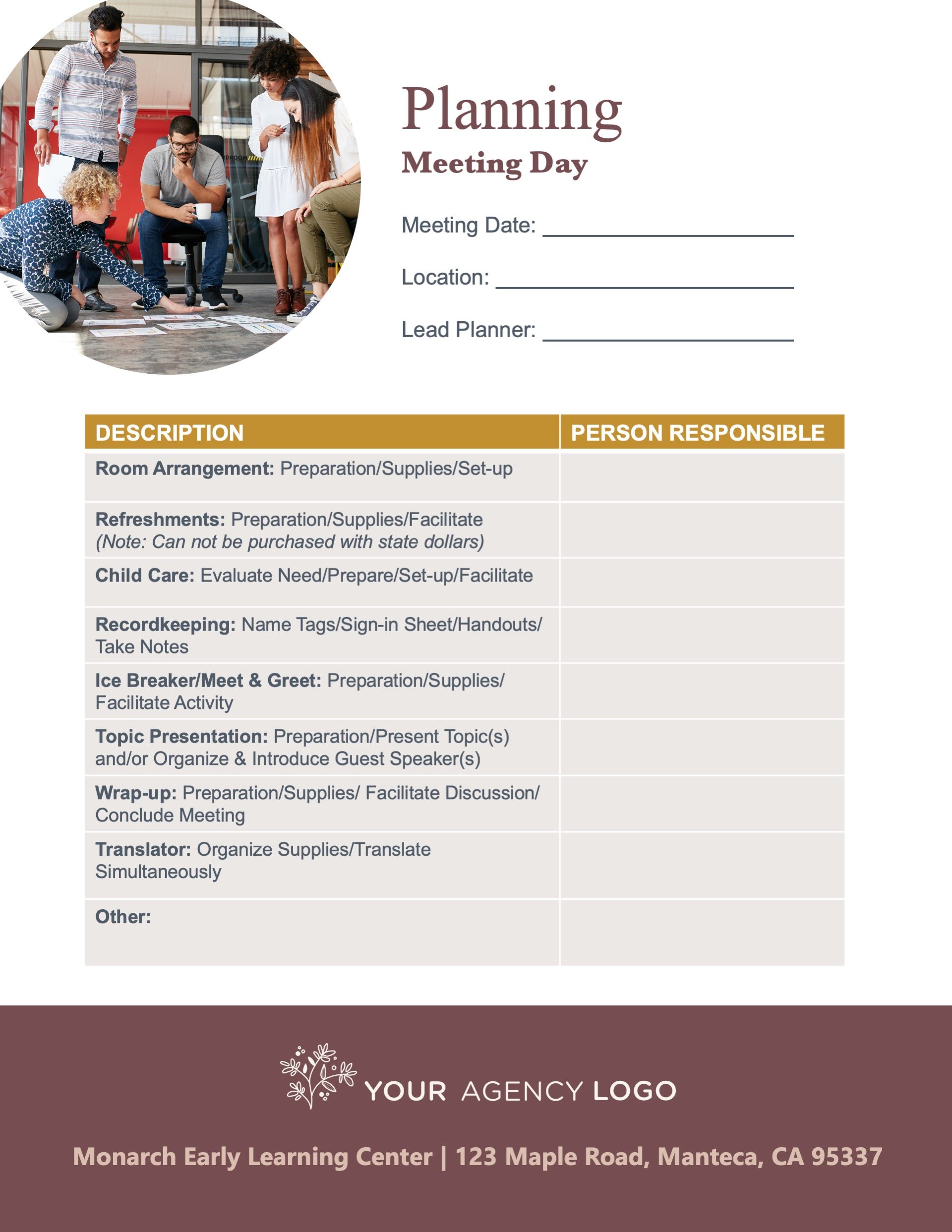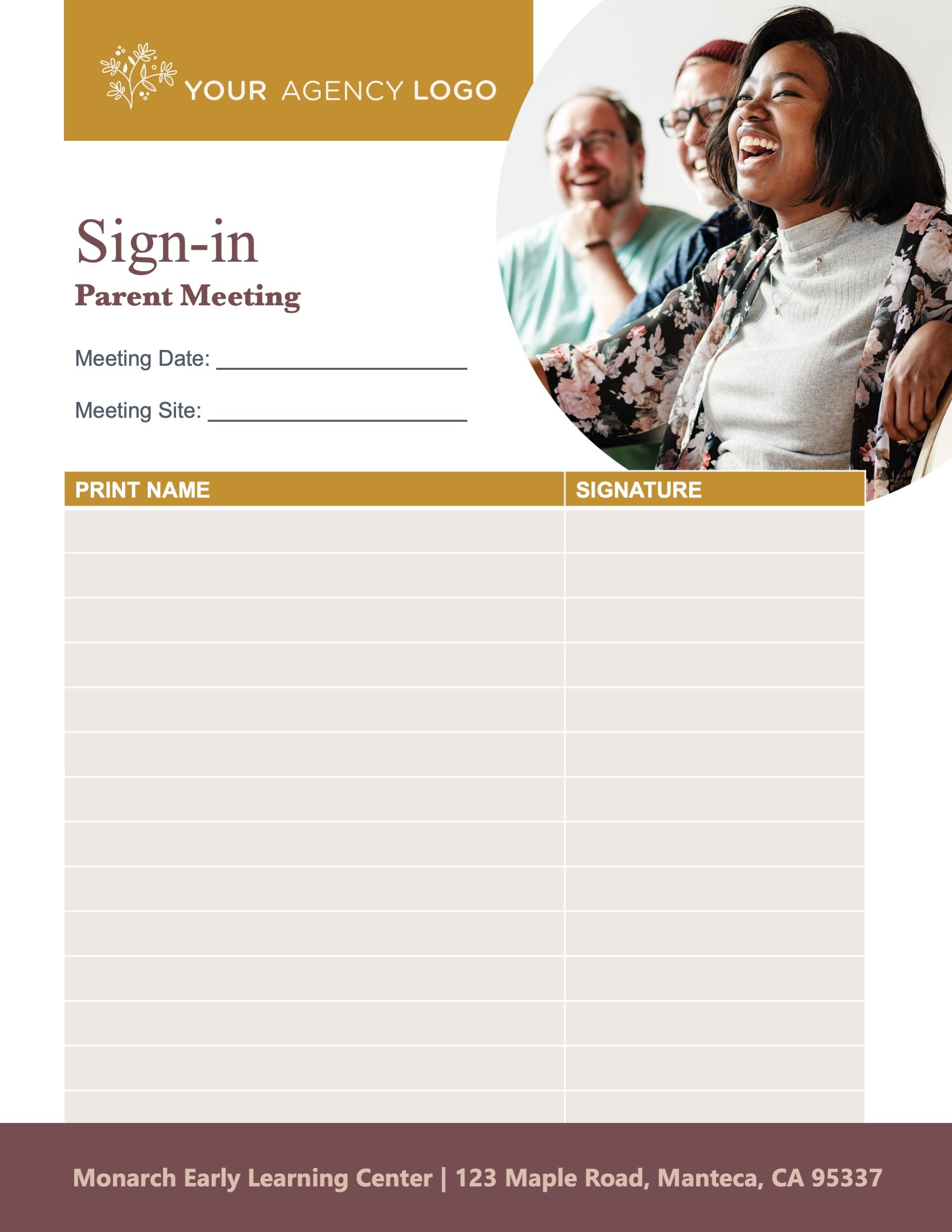Lesson 4
Parent Involvement & Education
Lesson 5
Health & Social Services
Lesson 6
Site Licensure & License Exempt
Lesson 7
Staff-Child Ratios
Lesson 8
Environment Rating Scale
Lesson 9
Nutritional Needs
Lesson 10
Desired Results Profile & Data
Lesson 11
Qualified Staff & Director
Lesson 12
Staff Development
Lesson 13
Refrain from Religious Instruction
Lesson 14
Inventory Records
Lesson 15
Annual Evaluation Plan
Lesson 16
Fiscal
Lesson 17
CDMIS 801A & 801B Reporting
Lesson 18
Contractor Policies
Compliance Indicator
There is a parent involvement and education component, including the sharing of program goals and structure with families. The program ensures that effective, two-way, comprehensive communication between staff and parents is carried out on a regular basis throughout the program year.
Regulations/Reference
CCD Program Instrument: II. Family Engagement CCD 07
Welfare & Institutions Code: 10207.5, 10208, 10240, 10250
Title 5: 18275
Monitoring Review Evidence
Completed Parent/Teacher Conferences
Open Door Policy Statement
Parent Advisory Committee
Parent Orientation Materials
Parenting Education & Parent Involvement
Parent Meetings
Schedule of Parent-Teacher Conferences
Watch Video Lesson ❯
Sample Forms/Tools ❯
Family Engagement Templates
Parent Handbook
Review Sketch Pad Notes ❯
Parent & Teacher Conferences
The regulations require that at least 2 individual parent-teacher conferences are held each year in order to share the results of their child’s assessments, screenings, progress & in collaboration with the parent develop individual goals for their child.
What this might look like in a program:
Meet the Teacher handout is used as a starting point for building relationships with parents. It lets parents get to know their child’s teacher. To show underneath it all, teachers are real people who have a heart for teaching
Important Date Calendar includes when parent-teacher conference week for both the first & second collections will be held
Invitation & What to Expect handout are given to parent 3 weeks & again 1 week prior to their conference date/time
Using data from the DRDP Online Child Rating Report, teacher completes a Child’s Developmental Progress Report form that is shared with parent(s), along with their child’s portfolio. In collaboration with parent, child goals & strategies are established
The regulations require that an agency have an open door policy that encourages parents to participate in the daily activities whenever possible.
Title 22 licensing regulations require open access during operating hours
Title 5 encourages parent participation
What this might look like in a program:
Statement located in participant handbook & bulletin board includes both access & encourages participation. A sample open door policy statement might state:
“You may visit your child’s classroom unannounced to observe your child at any time during operational hours. Our program is based upon a partnership with parents of the children enrolled. Parents are highly encouraged to participate in their child’s program.”
Desired Results Parent Survey
Desired Results Parent Surveys are distributed, collected & analyzed annually. Based on the outcomes, actions steps are developed & taken to support ongoing program improvement.
Distribute & Collect Survey: Distribute survey annually as part of the Program Self-Evaluation process. Parents may choose to complete the survey on paper or electronically.
Tally Results: After surveys are returned, results are tallied by program.
Analyze: Based on the tallied results, key findings are identified & documented on the Planning Worksheet: Summary of Findings
Action: Attainable Action Steps are developed & written on the Parent Survey Summary of Findings planning worksheet. Action steps are intended to support the program in progressing from:
Not Satisfied -> Satisfied or Very Satisfied
No -> Yes
Follow-up: At the time of planning, follow-up dates will be added to the program calendar. In addition, during the following program year self-evaluation, data will be analyzed to see if the identified area had improved. If no improvement, adjustments will be made.
Parent Meetings
The regulations require that parent meetings with program staff are held. Note that there is no set number of meetings an agency must have.
What this might look like in a program:
Staff use the Parent Meeting Kit to assist with planning, organizing & documenting meetings
Parent Club meetings are held 4 times per program year
Meeting topics include items identified from Desired Results Parent Surveys, along with the Parent Club Meeting survey that is completed at the beginning of each program year
Parent Involvement opportunities are outlined in participant handbook
Parenting education & parent involvement evidence includes: Schedule/Parent Important Date calendar, Meeting Announcements, Agendas, Sign-in Sheets, Minutes, Desired Results Parent Survey analysis
Parent Advisory Committee
The regulations require a contractor to have a Parent Advisory Committee, also known as PAC that advises the contractor on issues related to services to families & children. This can be done in a formal or informal model. Some agencies have bylaws & others hold a meeting with questions. A program simply needs to ask parents what they want to see in the program.
What this might look like in a program:
Parent Advisory Committee (PAC) meetings are held quarterly to gather input from parents regarding issues & what they would like to see in the program related to services to families & children.
Evidence includes: Schedule/Parent Important Date calendar, Meeting Announcements, Agendas, Sign-in Sheets, Minutes, Summary of Findings/Action
Parent Orientation Materials
The regulations require a contractor to have an orientation for parents that includes topics such as program philosophy, program goals and objectives, program activities, eligibility criteria & priorities for enrollment, and due process procedures.
What this might look like in a program:
Participant orientations are held as a group at the beginning of each program year & individually upon enrollment thereafter
The parent orientation video aligns with the participant handbook
Participants meet one-on-one with a site supervisor or teacher to go over licensing paperwork & receive a tour of the facility
Complete Knowledge Check ❯
After reviewing the video lesson & sketch pad notes, it’s time to check for understanding by completing a Knowledge Check. Note that Individual Knowledge Checks will conclude with a Certificate.










































